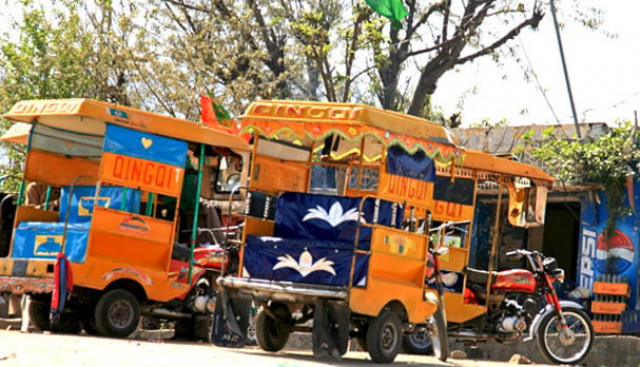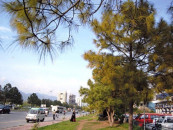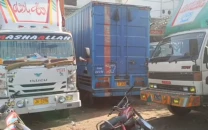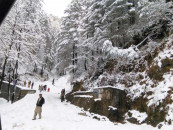Rickshaw ban sparks debate
As the government bans Qingqis and loaders from roads, critics argue the move will impact the livelihood and transport

The Punjab government has decided to ban three-wheelers rickshaws, in an attempt to curtail the air pollution, noise, disorderly traffic and accidents associated with the unsafe albeit popular mode of transport. However, the government's decision has instigated a wave of discontent among the low-income locals associated with the three-wheeler rickshaw, who now have to worry about switching to an alternative source of livelihood.
For instance, Zeeshan Ali, 23, who is the sole breadwinner of his household, revealed that he has been driving the Qingqi rickshaw since many years. "The government wants to stop our rickshaws. Where should a driver take a rickshaw worth Rs200,000. There are many drivers like me who earn a few hundred rupees a day through these rickshaws. If the government wants to ban rickshaws, it should give us some other source of livelihood," urged Ali.
According to documents obtained by The Express Tribune, more than 625,410 three-stroke registered rickshaws including Loader, Qingqi and others, are plying across Punjab, with almost 300,000 found in Lahore alone.
Majeed Ghauri, Chairman of the Awami Rickshaw Union felt that the government's haphazard decision to ban three-wheeler rickshaws unfairly targeted the low-income daily wagers. "The main problem is those makeshift rickshaws which have been manufactured by attaching a cart to motorcycles. Targeting all Qingqi rickshaws is unfair. The government must consider the plight of the rickshaw driver who has no other source of income. Furthermore, considering the state of public transport in Lahore, how will the metro and other buses meet the needs of 2.5 million people? Buses drop off passengers on the main roads while Qingqi runs on the side streets," observed Ghauri.
Addressing the concerns, Faisal Sultan, Secretary of the Punjab Provincial Transport Authority (PTA) assured that this decision was applicable to only those three-wheelers which were manufactured in the streets and not in the factories. "Makers take a welding machine, remove the rear wheel of a motorcycle and attach a vehicle to it that seats five to six people. When this vehicle goes at a speed of 60 to 70 kilometre per hour, especially in small towns, the motorbike part pulls ahead while the rear part with passenger's lags behind and is prone to accidents. There are 250,000 unregistered three-wheelers in Punjab. Neither can they be fined nor are they appearing in any record. We will ban them in a phased manner so that no one's employment is affected," said Sultan.
On the other hand, former Additional IG Traffic Muhammad Altaf Qamar believed that Qingqi rickshaws should be completely banned since they caused more than 25 per cent of traffic accidents. "These days, the donkey is removed from the cart and a motorcycle is fitted in its place for freight. This causes frequent accidents but no one is keeping check," claimed Qamar.
According to a spokesperson of the Punjab government, more than 250 factories manufacturing the bodies of illegal Qingqi rickshaws have been sealed in the province. It is illegal to build the body of Qingqi rickshaws without license and approval.
"So far, 65,000 three-wheeler rickshaw drivers have submitted applications, out of which 63,000 have been issued NOCs. More applications are coming in and are being processed. The government will crackdown against unregistered Qingqi rickshaws December onwards," said Sultan.



















COMMENTS
Comments are moderated and generally will be posted if they are on-topic and not abusive.
For more information, please see our Comments FAQ